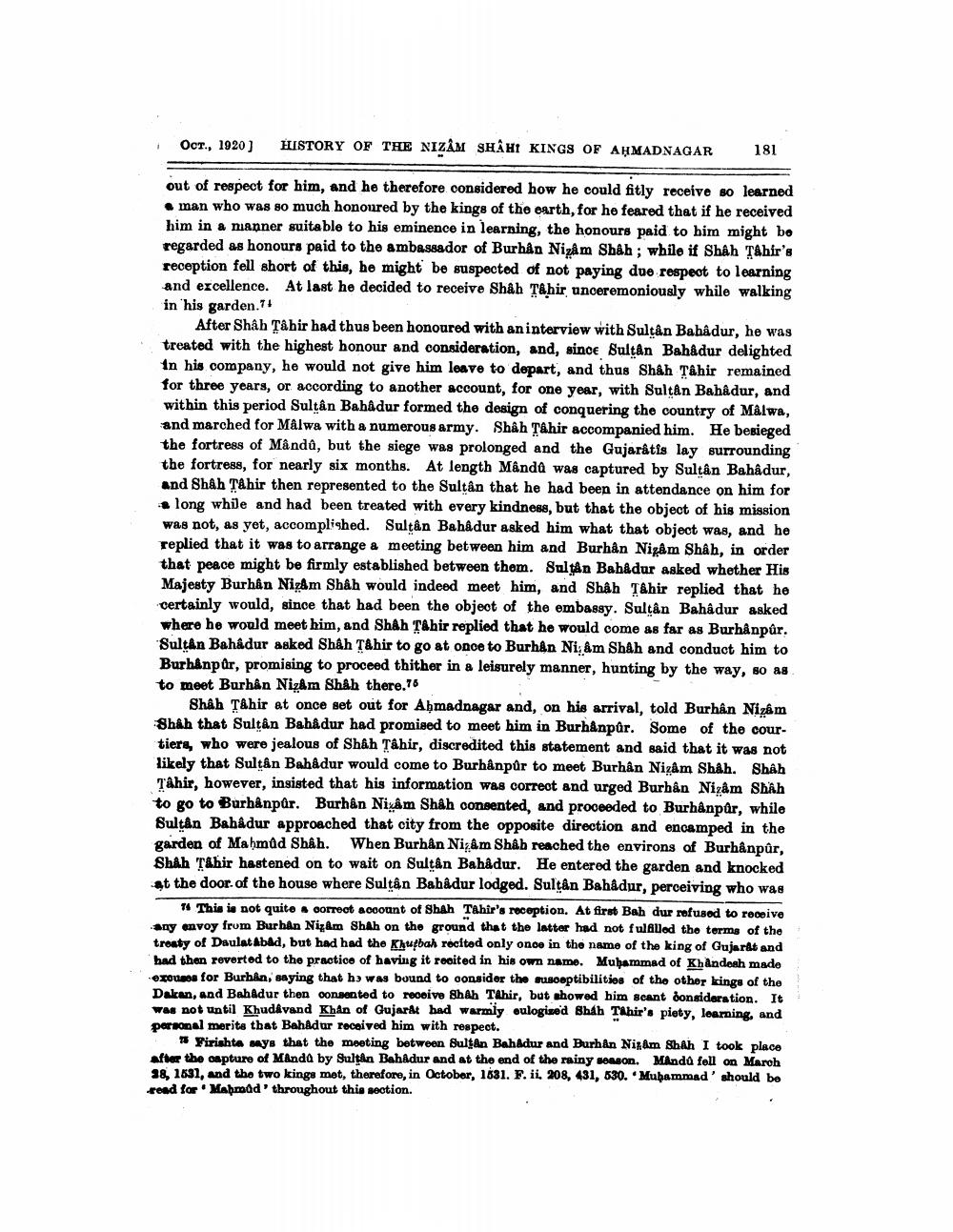________________
HISTORY OF THE NIZAM SHAHI KINGS OF AHMADNAGAR
out of respect for him, and he therefore considered how he could fitly receive so learned ⚫ man who was so much honoured by the kings of the earth, for he feared that if he received him in a manner suitable to his eminence in learning, the honours paid to him might be regarded as honours paid to the ambassador of Burhân Nizam Shah; while if Shah Tahir's reception fell short of this, he might be suspected of not paying due respect to learning and excellence. At last he decided to receive Shah Tahir unceremoniously while walking in his garden.7+
OCT., 1920]
181
After Shah Tahir had thus been honoured with an interview with Sultan Bahadur, he was treated with the highest honour and consideration, and, since Sultan Bahadur delighted in his company, he would not give him leave to depart, and thus Shah Tâhir remained for three years, or according to another account, for one year, with Sultan Bahadur, and within this period Sultan Bahâdur formed the design of conquering the country of Malwa, and marched for Malwa with a numerous army. Shah Tahir accompanied him. He besieged the fortress of Mândû, but the siege was prolonged and the Gujarâtis lay surrounding the fortress, for nearly six months. At length Mândû was captured by Sultân Bahâdur, and Shah Tahir then represented to the Sultân that he had been in attendance on him for a long while and had been treated with every kindness, but that the object of his mission was not, as yet, accomplished. Sultan Bahadur asked him what that object was, and he replied that it was to arrange a meeting between him and Burhân Nigam Shah, in order that peace might be firmly established between them. Sultan Bahadur asked whether His Majesty Burhân Nizam Shah would indeed meet him, and Shah Tahir replied that he certainly would, since that had been the object of the embassy. Sultân Bahadur asked where he would meet him, and Shah Tahir replied that he would come as far as Burhanpûr. Sultan Bahadur asked Shah Tahir to go at once to Burhan Ni âm Shah and conduct him to Burhanpûr, promising to proceed thither in a leisurely manner, hunting by the way, so as to meet Burhân Nizam Shah there.75
Shah Tahir at once set out for Ahmadnagar and, on his arrival, told Burhân Nizâm Shah that Sultan Bahadur had promised to meet him in Burhanpûr. Some of the courtiers, who were jealous of Shâh Tâhir, discredited this statement and said that it was not likely that Sultan Bahadur would come to Burhanpûr to meet Burhân Nizam Shah. Shah Tahir, however, insisted that his information was correct and urged Burhân Nizam Shah to go to Burhanpûr. Burhân Nizam Shah consented, and proceeded to Burhanpûr, while Sultan Bahadur approached that city from the opposite direction and encamped in the garden of Mahmûd Shah. When Burhân Nizam Shah reached the environs of Burhanpûr, Shah Tahir hastened on to wait on Sultan Bahadur. He entered the garden and knocked at the door of the house where Sultan Bahadur lodged. Sultan Bahadur, perceiving who was
74 This is not quite a correct account of Shah Tahir's reception. At first Bah dur refused to receive any envoy from Burhan Nizam Shah on the ground that the latter had not fulfilled the terms of the treaty of Daulatabad, but had had the Khutbah recited only once in the name of the king of Gujarat and had then reverted to the practice of having it recited in his own name. Muhammad of Khandesh made excuses for Burhan, saying that he was bound to consider the susceptibilities of the other kings of the Dakan, and Bahadur then consented to receive Shah Tahir, but showed him scant consideration. It was not until Khudavand Khan of Gujarat had warmly eulogized Shah Tahir's piety, learning, and personal merits that Bahadur received him with respect.
Firishta says that the meeting between Sultan Bahadur and Burhan Nizam Shah I took place after the capture of Mândů by Sultan Bahadur and at the end of the rainy season. Mandû fell on March 38, 1531, and the two kings met, therefore, in October, 1831. F. ii. 208, 431, 530. Muhammad' should be read for Mahmûd' throughout this section.




